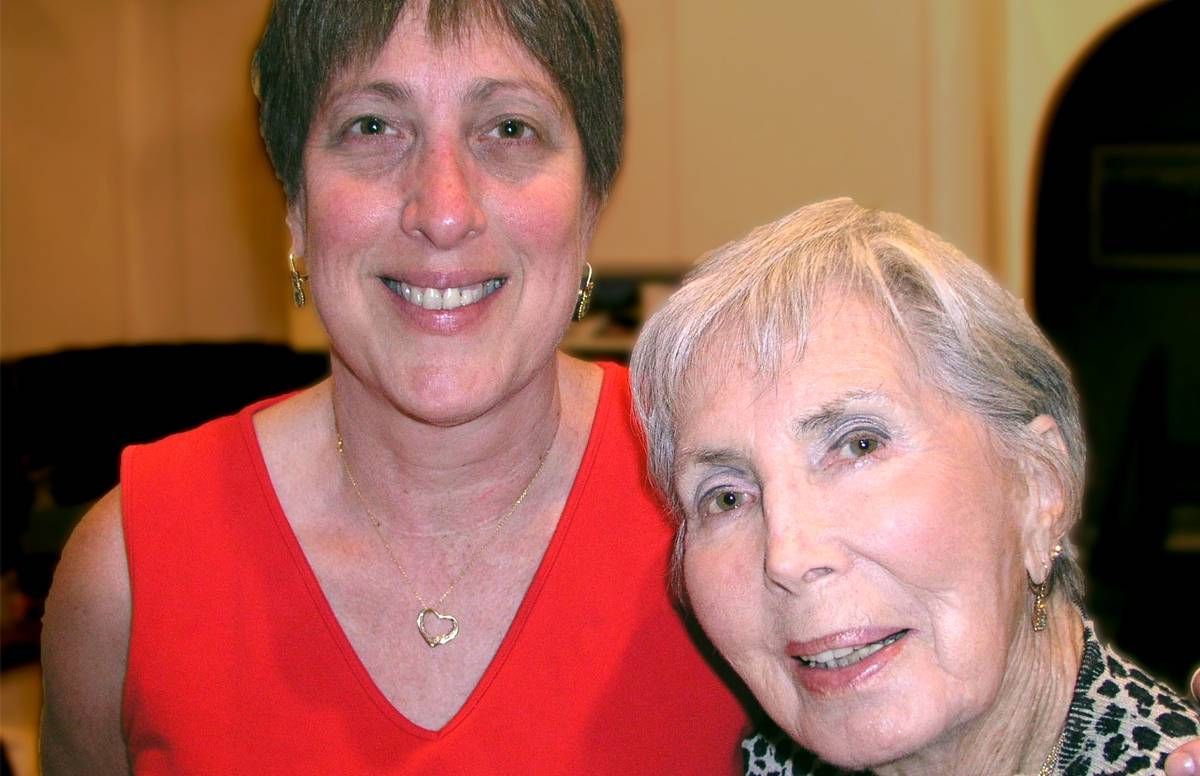Memories of a Sweet Treat With Mom
The tradition of 'froyo' at Bloomingdale's offered a respite for mother and daughter
Whenever I’m in the neighborhood, I stop for a frozen yogurt in New York City's Bloomingdale’s. Whether I’m shopping or not, I’ll head all the way up to the seventh floor to Forty Carrots just for their swirled refreshing treat. I pass on the sugary add-ins but in summer, when fruits look local and fresh, I’ll top it off with their original flavor with berries. I don’t even have to be hungry to sit and savor, spoon by plastic spoonful, slowing down when I inevitably get brain freeze.

Surprisingly, what I’m craving is my mother. Sharing one large "froyo" was our peaceful respite, détente from arguing over what clothes I should wear, my career choices, my parenting style. For those few moments, I was a small child again, out for an ice cream cone with mommy.
On Sundays, Mom would take my grandmother out from her nursing home for an ice cream cone. Afterwards, she’d drive us home from Jersey City to Brooklyn, staring intensely into the highway, a mysterious pained expression on her face. She’d flip on WOR talk radio to fill the silence.
Stories From a Painful Time
I didn’t know that Grandma’s nursing home was on the same grounds as the orphanage where my mother had lived from age six until her teens. Mom waited until her mid-eighties, when her Lewy Body dementia was progressing, to tell me, “My mother was too poor to keep me at home.”
The Jewish Home for Orphans, where my mother grew up feeling abandoned and unloved, was eventually transformed into a facility for older adults in need of full-time care. The chapel where Mom took Hebrew classes was still there, as were the painful memories where she went weeks, sometimes months, without a visit from her overburdened widowed mother.
She learned to keep her emotions to herself. Cool, sweet frozen yogurt dulled her pain for just a little while.
“She arrived through Ellis Island from Poland at the age of 17 without money or a word of English,” Mom finally explained, sounding more like an oral historian than someone struggling with the remnants of childhood trauma through unexplained fits of rage. “She migrated to this country after a jilted love affair. She went to night school immediately, learned the language. She worked in a factory by day and scrubbed floors in an office building at night.”
My mom saw her father only a couple of times. He died of tuberculosis when she was 10. My widowed grandmother made and sold bootleg gin during Prohibition, and took in boarders for income.
“But she didn’t have room for me,” Mom told me, her voice finally shaking as her abbreviated autobiography continued. “One day she said to me, ‘You don’t love me like a child should,’ and without thinking I said, ‘How could I? When all these years someone else brought me up?’”
She learned to keep her emotions to herself. Cool, sweet frozen yogurt dulled her pain for just a little while.
A Forced Intimacy
We shared froyo before, during and after the food trend started. She’d buy me outfits she insisted would flatter me in the Bloomingdale’s near her condo in Hollywood, Fla. We’d take a break for fuel at a more generic version of Forty Carrots than the flagship location on 59 Street.
I’d return the clothes when I got back to New York, fashions nobody would wear up north. Once, I received a snarky letter from Customer Service saying I was returning too many items. I used the refund to fund another plane trip to visit Mom.
I never left the store before soothing my spirit with frozen yogurt, alone, grieving over my mother’s decline in old age, the way Jewish mourners bring sweet pastries to shivah calls after a death to dull the pain of loss.
After I insisted Mom was no longer able to safely drive, I sold her car, let her license lapse and steered her to Bloomingdale’s in my rented car for frozen yogurt. When she could no longer use a credit card, I’d pick up the tab. When she needed me to escort her to the restroom afterwards, I obliged, ignoring my discomfort.
Once she asked me to take her to lingerie. I hadn’t even bought my daughter her first bra yet, and I was measuring my mother’s bust size, selecting something soft and flattering, guiding her into the dressing room, even fastening the brassiere when she was unable to figure it out.
Our forced intimacy had become commonplace, yet it always felt awkward and invasive.
The first time I saw her breasts when I was still a flat-chested teenager yearning to be as developed as my friends, I was shocked at how large they were — she was only a “B” cup, but she looked as zaftig as my well-endowed grandmother. Now, Mom’s breasts looked droopy and deflated, surrounded by folds of skin that hung from her torso.
“Something’s happened,” she said, staring into the mirror. “You’ve become my mother.”
'Makes a Girl Look Like What She Ain't'
Another time, she wanted to stop at the makeup counter. A woman with collagen lips gazed at my mother through eyelashes favored by silent movie stars. So began Mom’s first makeover since the heart surgeon implanted a stent in her blocked artery. I was dubious about makeovers, but in 10 minutes the garish black smudges above Mom’s eyes were gone. In spite of being an accomplished sculptor, my mother could no longer hold her hands steady enough to apply her makeup.
“You look great,” I told her.
“All that powder and perfume and paint…makes a girl look like what she ain’t.” Smiling, Mom was pleased to remember this phrase when she couldn’t recall my ZIP code. “Your turn.”
Reluctantly, I glanced in the mirror. “Anything to hide the dark rings under my eyes?” I asked.
“I’ve been telling her for years to cover those dark rings,” Mom said to the woman at the counter.
Ten hours of sleep a night and a vacation from the constant worry about my mother’s health might be the best prescription for the bags under my eyes.
“You need hydration,” the makeup artist said urgently, patting my skin with concealer.
In minutes. my face looked lighter, brighter, less haggard.
"Ever notice how many mothers and daughters are here, sharing yogurt?" my daughter observed.
“You both look ten years younger!” she pronounced, and that was enough for my penurious mother to consent to buying the ingredients for transformation. We left with two tiny shopping bags, a $250 tab and the doubt that we’d use these magic potions as effectively at home.
In the car, my mother kept lowering the visor so she could see her reflection in the mirror. “I like it,” she said. “What do you think?”
It makes her look like what she ain’t. “You look ten years younger,” I said.
“So do you,” she said. “Wouldn’t it be wonderful?"
A Mother-Daughter Tradition
After Mom died, it took years for me to return to Forty Carrots. Back in Bloomingdale’s, I was now shopping with my teenage daughter. Unlike my mother, I let her select her own styles. Like my mother, I taught her how to shop the sales. And we always finished up with frozen yogurt.
“To Grandma,” my daughter said, as if toasting cocktails. Her memories of my mother were less conflicted, not fraught with criticism and disputes.
Our routine continued as my daughter graduated from college, got her first and second jobs, moved into her own apartment.
“Ever notice how many mothers and daughters are here, sharing yogurt?” my daughter observed, amused, her lips rimmed with chocolate, her preferred flavor.
“Tradition,” I said, and we started humming the song from Fiddler on the Roof, my mother’s favorite show. It used to embarrass me when she’d sing this in public, but now I unabashedly belted out the tune.
These days, I dash into the Bloomingdale’s in Soho, which caters to hipper and smaller-boned women than me. I ask a saleswoman where Forty Carrots is. “It’s just been renovated!” she says in a chipper voice. “You’ll love it.”
It feels a bit too modern and stark, but I settle in with a frozen yogurt, slipping their new perk of a punchcard into my wallet, wondering how long it will take to get a free one. To you, Mom, I silently say, wishing she were here to share one with me. I can never finish it myself.


